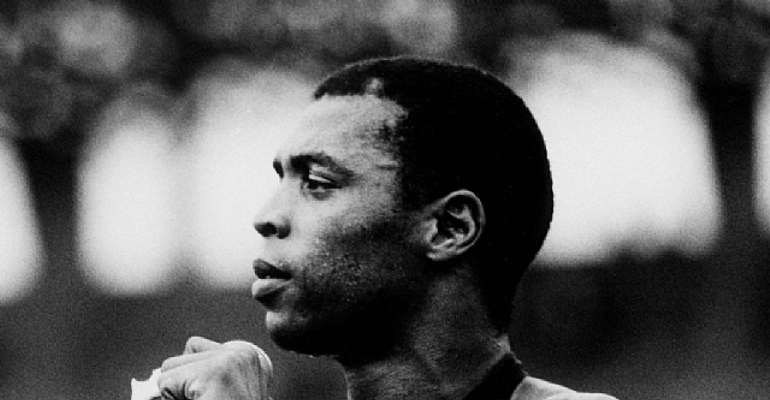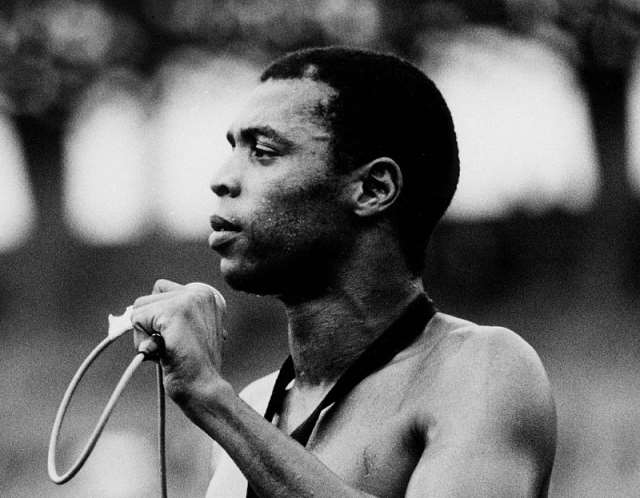Fela Anikulapo Kuti: Sixteen Years In Memory

Birth name: Olufela Olusegun Oludotun Ransome-Kuti
Born: 15 October 1938 Abeokuta, Nigeria
Died: 2 August 1997 (aged 58) Lagos, Nigeria.
Mother: Funmilayo Ransome-Kuti (Feminist activist)
Cousin: Prof. Wole Soyinka (Writer, Nobel Laureate)
Many persons will consider it a waste of ink that one should pick up a pen with the intention to write an article in remembrance of the father of Afrobeat, Fela Anikulapo Kuti. To these persons, Fela was nothing but a chariot of calamity, controversy and confusion, whose memory should be everlastingly bottled up in the grave.
Fela, they will say, baselessly attacked christianity and islam. Fela, they will say, was an atheist. Fela, they will say, was a polygynist who married twenty-seven women in a day. And Fela they will say, was an amoralist, who died of HIV/AIDS.
Yes, Fela was not a saint, as much as the reader is not a saint. In fact, Fela categorically told the world in one of his tracks that, "I no be gentleman at all, I no be gentleman at all, at all, I be African man original." It is undisputable that Fela lived an enigmatic lifestyle, a lifestyle so enigmatic and capricious that, he nicknamed himself "Abamieda" (the enigmatic One), and changed his middle name from Ransome to "Anikulapo" (he who carries death in his pockets). But Fela, through his queer lifestyle, succeeded in inspiring thousands of Africans accross the globe. It is for this latter reason, that I considered it worthwhile to write this article in remembrance of Fela aka Baba 70.
Fela Anikulapo Kuti was, quite unquestionably, one of the greatest Nigerians of all time. I came in contact with Fela long before I stumbled on the works of the German social philosopher and historian Karl Marx (1818-1883).
Fela I would say, was a kind of African karl Marx. Fela was a great social philosopher, a human right activist, a political satirist, a social reformist, a musician, a politician (though not too successful) and an Africanist. Since I do not intend to write a biography of Fela, I shall quickly point out what personally amazes me about his legacies.
Fela was among the most courageous Nigerians that ever lived. History has it that Fela blatantly criticized the tyrannical nigerian military government. In 1977, Fela and the Afrika '70 released the album Zombie, a scathing attack on Nigerian soldiers using the zombie metaphor to describe the methods of the Nigerian military (Wikipedia).
It takes boldness and fearlessness to attempt a feat as this, and as a result, only few Nigerians in living memory has done something similar. As it would be expected, Fela paid dearly for his fearlessness. In the same year, soldiers invaded his home. He was severely beaten, and his elderly mother was thrown from a window, causing fatal injuries. The Kalakuta Republic was burned, and Fela's studio, instruments, and master tapes were destroyed.
Fela was undeterred, he went on with his social crusade. He released more albums and criticized the government more eloquently. For this, I respect the great Fela Kuti.
Fela was also very active in the fight against apathied in South Africa. In 1989, Fela and Egypt '80 released the anti-apartheid Beasts of No Nation album that depicts on its cover U.S. President Ronald Reagan, UK Prime Minister Margaret Thatcher and South African Prime Minister Pieter Willem Botha (Wikipedia).
In the album Fela strongly criticized the United Nations, and drew to the attention of Africans, the hypocrisy of the United Nations. Again, I respect Fela for this, because evidently, the events in the past few years had exposed the biases in the United Nations.
Fela was a prophet. As far back as the 1970s, he warned Nigerians against religious fanaticism and religious 'followfollowism'. He massively attacked pastors and imams who uses the precious name of Jesus and Muhammed to extort their congregation. In the words of Fela "pope na miliki, imam na gbaladun".
Many christians and muslims all over the world had strongly criticized Fela for this, but myself and other distinguished world citizens, knew that Fela had spoken the undiluted truth. Recently, the debate regarding the rightness or wrongness of cleric to cruise private jets, rocked the national media.
This kind of debate is 'past tense' in the Fela's dictionary because he had discussed it long before anyone dreamt of it. Again, I salute the late Fela for his foresightedness.
Lastly, Fela was a promoter of Africanism. He promoted African values in his songs and through his lifestyle. His food was African, his music was African, his dress was African, and everything about him, was African. In one of his songs, the one that is presently jamming
into my medulla oblongata as I write, Fela advocated an African way of dressing. In his words:
Africa hot, I like am so
I know what to wear but my friends don't know
Him put him socks, him put him shoe
Him put him pant, him put him singlet
Him put him trouser, him put him shirt
Him put him tie, him put him coat
Him come cover all with him hat
Him be gentleman, him go sweat all over Him go faint right down, him go smell like shit
Him go piss for body, him no go know.
Although Fela Anikupo Kuti's bones would have decayed in the grave, but his legacies will forever remain. There is a fundamental similarity between the legacies of Fela and that of the great Chinua Achebe. But that is a subject of another article, that very soon, I hope to publish. It's been sixteen years since Fela joined other African heroes like Obafemi Awolowo, Nnamdi Akiziwe, Ahmadu Bello, Herbert Macaulay etc. I say rest in peace to Fela Anikulapo, your impact on our world is glaring.

Fela Kuti
